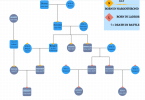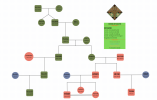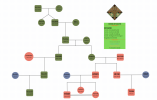Alcarohtar, welcome back! You are right, Tolkien makes a clear point that there is a direct relationship between the actions of Celegorm and Curufin in West Beleriand, and the unwillingness of both Doriath and Nargothrond to send warriors to join the fight in the Nirnaeth. Neither kingdom sends a significant portion of their strength, and thus Maedhros is hindered by the actions of his brothers when he tries to unite the Elves for a common cause. In building up the amdir of 'now is the time!' we do not want to lose sight of those consequences.
As you point out, we will want to be careful to differentiate what is happening in Doriath and Nargothrond. Gwindor's desire to go to war, how that conflicts with Orodreth's desire to stay out of the Union of Maedhros, and the eventual compromise to allow Gwindor to take a contingent so long as they do not march with any son of Fëanor - that story speaks to the cost of Celegorm and Curufin's actions when it comes to the death of Finrod. Both Orodreth and Gwindor will be at the Summit meeting. What happens with Thingol in Doriath when Beleg and Mablung wish to go to war after Thingol's representatives return from the Summit meeting should not be...'the same story.'
The Fëanoreans were banned from Doriath and labeled as 'kinslayers unrepentant' long before the events of the Dagor Bragollach. Even refugees from that war were denied entrance into Doriath from the East. The incidents with Lúthien have not improved the situation in any way. So, no, the Fëanoreans are not welcome in Doriath, and noone within Doriath has any sort of relationship with any of them. There is no diplomat ferrying back and forth between the groups. The views the people of Doriath hold of the Fëanoreans has not improved after they held Lúthien in Nargothrond and proposed that she marry Celegorm - We referred to it as 'house arrest'; they had lured her there by saying that Beren was there, and promising to assist her; they then took her cloak away from her and were holding her in Nargothrond 'for her own safety'... she was prevented from leaving, and her desire to avoid fighting her way out is what kept her there until Huan brought her her cloak and showed her a side exit. And in fact Thingol's response to that message was to send an army to Nargothrond to find and rescue her. While it's possible that Lúthien and Beren wouldn't be overly eager to talk about the Leap of Beren, they *did* tell Thingol's court about the Quest...and that was part of their experience of the Quest. We did not show that retelling on screen, so it's possible to interpret it as being an 'edited' version where not all details are given. But it's also not impossible that the entire court of Doriath is aware that the Sons of Fëanor made an attempt on Lúthien's life at that time. It seems unlikely that Lúthien would have left out the part of the story where Beren took an arrow for her, and how she was so worried that he would not survive....so that means mentioning where the arrow came from. Add to that the situation where Thingol has a silmaril, and *knows* that makes him a target of the Oath of Fëanor....yeah, there's some tension.
So, not everyone in Nargothrond wants to join the fight, and the king is opposed. But the motivation behind that is mostly Finrod-centric, and fear of losing the safety of the secrecy of Nargothrond. Not everyone in Doriath wants to join the fight, and here it will probably be a mix of complacency thinking they are safe behind the Girdle, and anger over how Lúthien was treated by the Sons of Fëanor (or anger about them in general). If Thingol does allow for volunteers, and Beleg and Mablung wish to go...they should not have that many elves join them. We have few named elves in Doriath to refuse the call, but Saeros certainly would. And we've discussed keeping Celeborn out of the fight as well. Alternatively, we can have Thingol not send any warriors at all, but a small guard to accompany supplies sent north...which would turn into those guards being drawn into the war and the fighting. A lackluster call for volunteers would show the overall mood of Doriath, though, and be a good way to take the story outside the court.
As for the Fëanorean approach to Doriath...I think it is quite possible that we will see Maedhros behave a bit dictatorially with his brothers here. He's not so much persuading them as informing them that this is how things will be. His anger over the actions of Celegorm and Curufin suggest that he's not exactly listening to their input right now. We should sow the seeds for a shift in the balance of power amongst the brothers. Maedhros was a victorious leader in the Dagor Bragollach, while his other brothers failed. He feels quite justified in calling the shots, and it's his plan. When this plan fails...everything he said about how they should follow him due to his success would be overturned. So, if there are any grumblings about Thingol, or his silmaril, or Doriath...Maedhros can shut them down without discussion for now (especially/specifically this topic). But it's obviously going to come back later. Maedhros will be putting more effort into persuading the other Noldor, and the Men, and the Dwarves - he's going to take his brothers a bit for granted here.
As you point out, we will want to be careful to differentiate what is happening in Doriath and Nargothrond. Gwindor's desire to go to war, how that conflicts with Orodreth's desire to stay out of the Union of Maedhros, and the eventual compromise to allow Gwindor to take a contingent so long as they do not march with any son of Fëanor - that story speaks to the cost of Celegorm and Curufin's actions when it comes to the death of Finrod. Both Orodreth and Gwindor will be at the Summit meeting. What happens with Thingol in Doriath when Beleg and Mablung wish to go to war after Thingol's representatives return from the Summit meeting should not be...'the same story.'
The Fëanoreans were banned from Doriath and labeled as 'kinslayers unrepentant' long before the events of the Dagor Bragollach. Even refugees from that war were denied entrance into Doriath from the East. The incidents with Lúthien have not improved the situation in any way. So, no, the Fëanoreans are not welcome in Doriath, and noone within Doriath has any sort of relationship with any of them. There is no diplomat ferrying back and forth between the groups. The views the people of Doriath hold of the Fëanoreans has not improved after they held Lúthien in Nargothrond and proposed that she marry Celegorm - We referred to it as 'house arrest'; they had lured her there by saying that Beren was there, and promising to assist her; they then took her cloak away from her and were holding her in Nargothrond 'for her own safety'... she was prevented from leaving, and her desire to avoid fighting her way out is what kept her there until Huan brought her her cloak and showed her a side exit. And in fact Thingol's response to that message was to send an army to Nargothrond to find and rescue her. While it's possible that Lúthien and Beren wouldn't be overly eager to talk about the Leap of Beren, they *did* tell Thingol's court about the Quest...and that was part of their experience of the Quest. We did not show that retelling on screen, so it's possible to interpret it as being an 'edited' version where not all details are given. But it's also not impossible that the entire court of Doriath is aware that the Sons of Fëanor made an attempt on Lúthien's life at that time. It seems unlikely that Lúthien would have left out the part of the story where Beren took an arrow for her, and how she was so worried that he would not survive....so that means mentioning where the arrow came from. Add to that the situation where Thingol has a silmaril, and *knows* that makes him a target of the Oath of Fëanor....yeah, there's some tension.
So, not everyone in Nargothrond wants to join the fight, and the king is opposed. But the motivation behind that is mostly Finrod-centric, and fear of losing the safety of the secrecy of Nargothrond. Not everyone in Doriath wants to join the fight, and here it will probably be a mix of complacency thinking they are safe behind the Girdle, and anger over how Lúthien was treated by the Sons of Fëanor (or anger about them in general). If Thingol does allow for volunteers, and Beleg and Mablung wish to go...they should not have that many elves join them. We have few named elves in Doriath to refuse the call, but Saeros certainly would. And we've discussed keeping Celeborn out of the fight as well. Alternatively, we can have Thingol not send any warriors at all, but a small guard to accompany supplies sent north...which would turn into those guards being drawn into the war and the fighting. A lackluster call for volunteers would show the overall mood of Doriath, though, and be a good way to take the story outside the court.
As for the Fëanorean approach to Doriath...I think it is quite possible that we will see Maedhros behave a bit dictatorially with his brothers here. He's not so much persuading them as informing them that this is how things will be. His anger over the actions of Celegorm and Curufin suggest that he's not exactly listening to their input right now. We should sow the seeds for a shift in the balance of power amongst the brothers. Maedhros was a victorious leader in the Dagor Bragollach, while his other brothers failed. He feels quite justified in calling the shots, and it's his plan. When this plan fails...everything he said about how they should follow him due to his success would be overturned. So, if there are any grumblings about Thingol, or his silmaril, or Doriath...Maedhros can shut them down without discussion for now (especially/specifically this topic). But it's obviously going to come back later. Maedhros will be putting more effort into persuading the other Noldor, and the Men, and the Dwarves - he's going to take his brothers a bit for granted here.



